The changing environment resulting from this year’s coronavirus pandemic has brought about experiences that many people have never experienced before. When foreigners began returning to Guangzhou, officials noticed an increase in confirmed infections of the COVID-19 virus with an apparent volume within people from a few African nations. Subsequently, Guangzhou officials took the action of requiring all Africans living in the city to quarantine for at least two weeks–regardless of whether they had traveled or been in contact with anyone who was sick.
Spinning off this local government’s new regulation, police in Guangzhou even told restaurants and stores to not allow anyone who is black to enter their facilities. The resulting concern and fear from these actions created a tense and difficult time for many black people in Guangzhou. New stories are being told of this detestable discrimination against black foreigners. Local and national governments in China have since issued anti-discrimination policies to address these issues and prevent further development of biased actions in China.
Outside of downtown Guangzhou, local governments and police have not allowed such discriminatory behavior. And even though there are still unique challenges for black foreigners in China, the situation hasn’t been what some have experienced in downtown Guangzhou. Two of our staff members living in Hangzhou and Shenzhen share their stories of being a black foreigner in China.
Hangzhou
For the last two weeks, I’ve woken up to messages from friends and family abroad asking two questions: “Is this true?” and “Are you guys ok?” “This” refers to what I refer to as the ugliness in Guangzhou between locals and the African population there, portrayed and reposted all over social media, prompting the aforementioned concern.
We’ve actually been asked these questions since mid-January when the COVD-19 stories started breaking. I understand the concern over COVID-19, but I have to admit I was a little irritated that people seemed to go by press coverage that wasn’t always entirely accurate or truly representative of what was happening in China. So, I appreciate people wondering whether the depictions of the gross discrimination of Africans in the southern city of Guangzhou were actually real. I wondered myself. I was heartbroken, then angry to discover that it was all too real. As was the warning from the U.S. State Department that African-Americans should be careful and stay away from downtown Guangzhou. As various WeChat groups sounded the alarm and expressed their horror, I started to feel even more upset on behalf of my colleagues and friends in Guangzhou.
Though we are far away geographically in Hangzhou, my fellow African-American colleagues and I empathize. It hits home for me and so many of us who left the States because of the discrimination so many of experienced and witnessed there. Despite all this, I’m not walking away from China. I have children here, and I can’t justify uprooting them again when things are so different in Hangzhou. Right now, there is antipathy and fear of ALL foreigners, and actually it feels like being black is a plus here. I’d be lying if I said that it has been easy to be black in China; however the vast majority of locals are super kind and are fascinated by us. There are issues like strangers touching our hair and taking unauthorized photos of us, but my children have gotten to the point where they either offer to pose, or even charge for photos of them! Their Chinese is good enough that they actually respond to–and impress people talking about us who think we don’t understand.
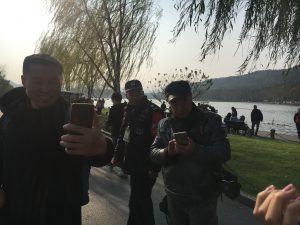
As a single mom, I’m saving more money than I ever could have, our apartment is really great, and I’ve had extensive dental work done at a fraction of the price. I also really respect how Chinese people responded during the epidemic–putting the public good first. The experience that we’ve gotten from living and traveling abroad gives my family opportunities that few black people in the West could get. Just being able to take the train and get to one of the world’s most famous and historic cities, Shanghai, in less than an hour is so cool.
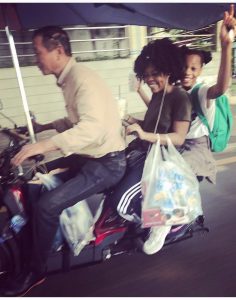
Living here has been challenging, but I’ve chosen to engage with people who wouldn’t normally ever see black people, and in 99.9 percent of the cases, it has led to better understanding and open dialogue on both sides. I would tell those hearing about Guangzhou that it’s necessary to see the whole picture and realize that like us, Chinese people are diverse, and that not ALL Chinese people are like-minded. I know so many who are equally horrified. I feel safer here than anywhere else in the world–even now.

Lily Lufuloabo, BASIS International School Hangzhou
Shenzhen
What are they looking at?
It was a common thought during my first visit to Shenzhen. I came to visit a friend before I decided to work in China. She had already been in the country for two years, and I wanted to test the waters. I needed to see how much of a culture shock I should prepare myself for. I knew it would be an experience, but what I didn’t prepare myself for was the stares. A bit of context: I am 6’4″ tall and dark-skinned. In short: I “look like I play sports” to most people. So while Americans’ eyes occasionally gaze at my physical stature, it was a different experience. I felt eyes burning holes into my clothes as everyone looked in awe as I towered over many of them. For those that were able to snap back to reality and have presence of mind, camera phones and digital cameras snapped to snatch parts of my being for their permanent collection…most likely to be plastered in a WeChat group and be the temporary subject of affairs for some.
“Jimmy Butler!” “Basketball Man!” “Fill in generic dark-skinned black male celebrity!” “You must be them!” You did it. You caught me. I was planning on having a low-key vacation playing pick-up basketball in Shenzhen, China until your keen eye found me. I just wanted to play basketball in its purest form during the NBA regular season, so I came to play the general population in China. My sarcasm, however, did not brace me for what would happen once I stepped on the court.
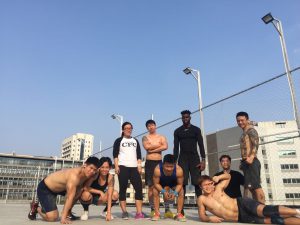
“It is because you are a foreigner…” whispered one of my Chinese teammates. “They want to say they beat the black foreigner when they go home.” So, they did whatever it took: they shaved points off of the game. They didn’t call my fouls. I was tripped, hacked, and pushed most of the time. But all of this aggression culminated in the worst ankle sprain I have ever felt when an opponent rammed into me blindly barreling to the goal in hopes of dominating glory. As I smacked to the floor, my only thought: I hate this place!
As I gingerly limped home, the co-worker I went to play ball with was doing his best to make light of the situation, but he is white. He just didn’t feel what I felt. I was tired. I wanted to go back to what I knew. America just seemed easier at the moment. It was at that point I had to stop myself. Really…did you forget what America is like?! It is true that I was just romanticizing the best parts of America that I missed–mostly southern cooking. However, with those southern dishes came a steaming plate of systemic racism drizzled in colorblindness. I had to get a new perspective. I had to look at this situation fully. Not negative. Not positive. Just what it is. What is the other side of this?
To put it simply: I do NOT fear the police here. I look at them as a part of society that serves the purpose of protecting its people. I do not think that they will draw a weapon on me and that could spell the end for me. The worst that has happened is one well-deserved biking ticket and plenty of unsolicited photos. The police usually will stand in amazement of me or smile and wave on the way to BASIS International School Shenzhen. Honestly, that has been my biggest adjustment: not looking at the police and having the knee-jerk reaction that most of us as Black people have. As a Black kid that looks like an adult since 14, it is actually a relief to see what it’s like for the police not to hassle me when I am out in public. I’m not the threat to them that I pose in America. It hurts to say, but it is the truth.
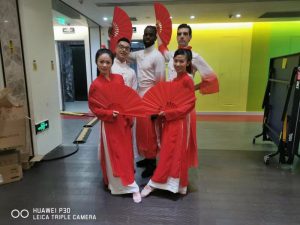
Many of those stares aren’t what I initially believed them to be. Most were not filled with hatred or disdain. I was unaware of a simple fact. A person in China can go their entire life without physically seeing a Black person, let alone speaking to one. The photos can be a bit invasive, yes; however, I have learned to see the curiosity from a different perspective. Many would probably ask questions–if they had the ability–because they want to know a lot more. The students at school are proof of this. In addition to the curiosity that comes with youth, they just don’t know what Black culture truly is beyond what is easily accessed through their phones. Having these honest and, sometimes difficult, conversations with them about what Blackness is and what it is not actually shows that there is a lack of knowledge that comes with not interacting with other POC. I love the development that many of the students I have taught over these last two years have had. They have personally thanked me for being honest and opening their eyes to a different understanding. However, with all that said and how much I dearly love each and every one of them, they still ain’t touching my hair. This ain’t a petting zoo.
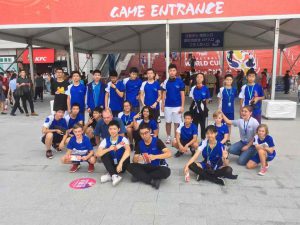
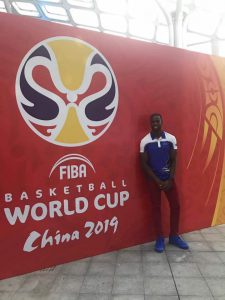
Renewing my contract at BASIS International School Shenzhen has confirmed that the juice is worth the squeeze thus far. The stares have faded into a normal occurrence. I have found certain places I can frequent. Heck, I even found some people that I can play pick-up games with that won’t leave me hobbled and frustrated…as much. Expecting a perfect transition to anywhere in this world as a POC, especially a Black person, is unfortunately a naive notion. However, knowing that each place will have its benefits and difficulties is a way to prepare yourself for what may come. I can’t promise that it’ll be lollipops and rainbows, but a few Black WeChat groups, kickbacks, and regularly scheduled calls home can ease most of the tension. And, frankly, if you can make the racism in America tolerable, China’s is light work!
Racism isn’t something that is unique to anywhere. It just comes in different flavors. The only question you should ask is this palatable enough for you?
P.S. A word of advice: learn some Chinese to get you around and speaking to people. It’ll make you feel and look like less of an alien on a normal basis.

Jason Quaynor, BASIS International School Shenzhen